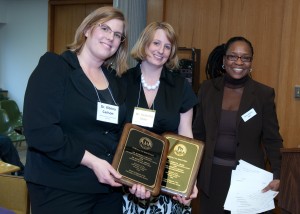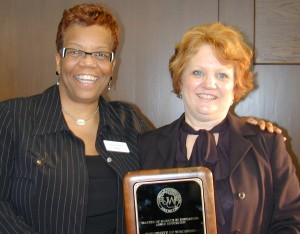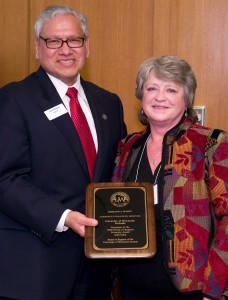Recipients of first Regents Diversity Awards honored
MADISON – The University of Wisconsin System Board of Regents gathered for a one-day meeting on Thursday, devoting most of the session to broad discussions about two issues – the proposed 2009-11 biennial state budget and next steps in the UW System’s work on equity, diversity, and inclusion.
Budget impact on universities, students
While the proposed state budget does contain some good news for the University, most of the attention at the meeting focused on how the cuts and reallocated funding will impact campuses and students. Amidst a massive state budget deficit and deepening recession, the UW System must begin planning today for significant budget cuts over the next two years. View presentation on the
.
The real question, said UW System President Kevin P. Reilly, is “how much capacity does the UW System really have to absorb any kind of budget cut, and how do we begin to assess the real impact of a cut on our core operation of educating students?”
After stripping away targeted, earmarked or restricted funding, the UW is left with about $1.8 billion in unencumbered dollars to support direct instruction of students, Reilly said, with $860 million in GPR and $981 million in tuition.
“When we talk about students shouldering a bigger share of their instructional costs, this is what we mean,” Reilly said. “Students today are already paying 53 percent of those direct costs.”
Reilly also addressed some of the misconceptions or myths regarding the UW and how it has fared under the proposed State budget.
First, he said, the UW System is not flat-funded. “Our total GPR reduction of $120 million, which will come from the core of our educational operations, amounts to a 5.2 percent cut over the biennium,” Reilly said.
Second, tuition cannot realistically be used to backfill the budget gap. “To offset the $120 million in GPR cuts alone, UW System would need to increase tuition by 17 percent in the coming academic year. Believe me, nobody would be happy with that prospect – and it’s not going to happen,” Reilly said. “It is vital that we preserve affordable access to the UW.”
Tuition will be set by the Board over the summer. “We hope to be able to recommend a moderate, reasonable tuition increase – one that will therefore not come close to filling the budget gap as it now stands,” Reilly said.
To help preserve affordable access to college, Reilly recognized the Governor for accepting the UW’s recommendation to investment in a bold new commitment to financial aid, at a time when hardworking students need it most. “We hope this sends a strong message to Wisconsin families well up into the middle class that a UW education will be affordable for your son or daughter,” Reilly said.
A third misconception addressed by Reilly is that federal stimulus funding will “fix the problem” for UW. Reilly said that the federal stimulus funds do not directly impact the UW System, but acknowledged that without such funding coming into the state, the university’s situation would have been much worse. “We have been told that it fills holes elsewhere in the state budget that otherwise would have increased our cuts,” he said. View presentation on the .
Several chancellors addressed the Board to provide their perspectives on how the proposed budget reductions will impact campuses.
UW-Madison Chancellor Carolyn “Biddy” Martin pointed out that the College of Letters and Science, the largest on the Madison campus, has already lost 66 faculty lines in the past 5 to 10 years. Further cuts would mean reductions in economics, chemistry, biology, and Spanish – areas of extraordinary demand. Funding cuts could also mean limiting enrollment in fields like nursing, where workforce demands suggest the opposite.
“Let us take our share of pain, but let us not undermine the extraordinary quality of UW-Madison or the UW System,” Martin said.
UW-La Crosse Chancellor Joe Gow said his campus, like others around the System, was not surprised at being asked to cut costs. Strategies to comply have been long under way. But he was surprised when UW-L was asked to chip in about $5 million from its auxiliary cash reserves.
“La Crosse can be the glaring example of the drawbacks of transferring funds that are used for things that are not glamorous but useful – plumbing that’s falling apart, broken dishwashers, updating fire alarms,” he said.
Regent David Walsh urged the Board to remember “the big picture” as it considers budget questions. “Let’s not lose track of what’s happening in the real world,” he said. “We are in a bad, bad time. So the issue for me is not do we have some pain, but if we’re going to have pain, is it fair?”
Noting other things the Governor has extended to the University, including increased financial aid, recruitment and retention assistance, and additional research funding, Walsh added, “At this time in our state’s history, I think we all have to have a little common sense about where we’re going.”
Regent Elizabeth Burmaster agreed. “In the K-12 system, we see every day, face to face, the impact of our economic situation. Just look at the rising homelessness, homeless schoolchildren. That’s pervasive throughout our state. I think we have to rise to that level of understanding of what’s going on. There’s going to be pain everywhere.”
Regent Charles Pruitt re-emphasized to the Board that the current budget is a work in progress and “we need to appreciate there are miles to go before we sleep in terms of the resolution.” He added that, “Budgets are about choices and values. I do think these are extraordinarily difficult economic times and the Governor’s proposal affirms his long-standing commitment to education. We can see it in the financial aid proposal. .. Part of our message needs to continue to be that we are ready, willing and able to work going forward on sorting out what makes sense and working through the problems and recognizing what we have to contribute to the solution.”
Next steps in UW Systems work on equity, diversity, and inclusion
As the UW System looks back on its now completed Plan 2008, to build educational quality through ethnic and racial diversity at all of its institutions, Reilly told the Board that “while we have made some progress toward our goals … we have not moved fast or far enough.”
“We are moving in the right direction, and it’s important that we continue in these efforts,” Reilly said. “The goals of the Growth Agenda and the UW System’s diversity agenda are inextricably linked – one cannot be accomplished without the other. Much work remains if we are to succeed, and we recognize the challenges.”
Reilly noted the progress made in increasing the enrollment of undergraduate students of color (up 51 percent from 10 years ago), the narrowing of the gap in retention and graduation rates between white students and students of color, and the increased number of employees in color across the UW System, as positive markers of the plan.
But with the state’s population becoming increasingly diverse, Reilly said success with the Growth Agenda requires that the university be “much more successful with educating and graduating many more students from all backgrounds, to ensure that they are well prepared to be engaged citizens, who can contribute to and compete in the 21st-century global society and marketplace.”
The University must build on “what we did right – and what we did wrong” in its follow-up initiative to Plan 2008, to be called Inclusive Excellence, Reilly said.
Senior Vice President Rebecca Martin told the Board that the name of the initiative is intentional and significant: “We cannot have excellence without diversity; the two are deeply intertwined.”
She said the primary difference between the current initiative and its predecessors is that “past strategic plans prioritized the focus on race and ethnicity because of persistent, glaring inequities in outcomes that we know are still present.” Inclusive Excellence builds on the previous work and “expands the scope of that work and the full range of diversity we must leverage for personal, institutional, and cultural change,” she said.
Martin emphasized that UW is not abandoning the unfinished agenda of Plan 2008. “UW institutions will have to update and incorporate those goals and objectives into their institutions’ comprehensive strategic plans to achieve Inclusive Excellence,” she said.
Associate Vice President Vicki Washington added that the success of the Inclusive Excellence program demands full engagement. “Inclusive Excellence recognizes that in order for diversity to truly take root in an institution, everyone – regardless of formal role, position or title – must find a way to attach themselves to the work of diversity and assume responsibility for carrying it forward,” she said.
UW-Oshkosh Chancellor Rick Wells told the Board that Inclusive Excellence involves a change in mindset. “It requires us to take ownership of what we actually have control of, to pay attention to what’s in front of us,” Wells said.
Regent José Vásquez urged the Board to emphasize successful outcomes as a measure of Inclusive Excellence’s effectiveness, rather than the volume of students brought into the System.
Drawing on her many conversations with students groups in recent months, Regent Colleene Thomas noted that it’s difficult to reach consensus in discussions of this nature, but that such conversations are going to be increasingly important. She encouraged the Board to frame the discussion even more broadly, not just in identifying people of color or some other markers. “It’s about how every single student in the System reacts to the changing world around them and being able to function with people who are different from them,” she said.
Martin said that there will be a follow-up report to the Board on Inclusive Excellence late next fall.
Board recognizes first Regents Diversity Awards winners
The Board honored the inaugural winners of its Regents Diversity Awards. The awards program was established by the Board to recognize and support individuals and programs in the UW System that foster access and success in university life for historically underrepresented populations.
“Such plans have no real meaning or impact without people to breathe life into them, to make them come alive,” said Regent José Vásquez, who chaired the regents’ selection committee for the awards. “Without that human touch, plans are only words on a page.” He said that the award recipients transformed such plans into reality.
“Each of our recipients uses a different approach in their diversity work, yet their efforts resemble each other in several key aspects,” Vásquez said. “In their work, you will find a genuine respect for human differences; a deep attentiveness to the learning process; and a keen responsiveness to students and their educational needs.”
Roseann Mason, Director of Community Dialogues in the Center for Community Partnerships at UW-Parkside, was recognized in the individual category. Among her accomplishments, Mason developed Diversity Circles that focus on recognizing and countering racism in its many forms. The circles, which launched in 1999, have been integrated into local high schools since 2003.
In introducing Mason, Vásquez noted that she has spent more than 20 years working on issues related to diversity, nearly all of them at UW-Parkside. “According to another Parkside colleague, her longstanding tenure and the compassionate manner she exhibits towards students and peers has earned her the reputation as the ‘gentle matriarch’ whom everyone turns to for guidance, comfort, and strength,” Vásquez said.
While accepting the award for what she called her “personal passion,” Mason thanked the Board for the vital institutional support it provided for multicultural awareness.
In the team category, Rebecca Abler, assistant professor of Biological Sciences at UW-Manitowoc, and Kitrina Carlson, associate professor of Biology at UW-Stout, were cited for their direction of “Portals of Discovery: Increasing Opportunities in STEM through Collaborative Research.” The project capitalizes on innovative research collaborations to increase the number of women and people of color into the science, technology, engineering and math fields.

(from left) Dr. Kitrina Carlson and Dr. Rebecca Abler accept their Diversity Award in the team category from Regent Betty Womack.
“(Portals of Discovery) provides strong, rigorous, academic preparation for its young students of color, the same kind of science and mathematics-based skill-building that we have long sought among our pre-college programs,” said Regent Betty Womack, in introducing Abler and Carlson. Womack also cited the close attention paid to culture and cultural identity via the program. “It is science and cultural bridge-building all at the same time,” she said. “This is an innovative approach to the learning and teaching of STEM that we have not seen before.”
Abler said the project really has been about putting the Wisconsin Idea in action. “That’s the driving force that had Katrina and I pushing forward,” Abler said. “We believe in reaching out to these underrepresented populations so they can get their piece of the puzzle.”
Carlson added that support from their home institutions has allowed them to “think big” with the project.
UW-Platteville’s Master of Science, Adult Education program
Regent Danae Davis presented UW-Platteville’s Master of Science, Adult Education program with the institutional/unit category award, which was accepted by program coordinator professor Patricia Bromley. Since 1995, the off-campus graduate program at UW-Platteville has been highly successful in resolving the difficulties that first-generation college graduates have historically experienced in pursuing graduate education while maintaining full-time employment, particularly in the areas of human service and education.

Regent Danae Davis (left) presents Professor Patricia Bromley, program coordinator for UW-Platteville’s Master of Science, Adult Education, with a 2009 Diversity Award in the institution category.
“This is an extraordinary initiative, one that models the kind of responsiveness to student needs that we have come to expect from our UW institutions, and that we need to see more of,” Davis said. “We hear a lot about the need to reach a critical mass of underrepresented students of color at UW institutions. Is 40 percent of students [of color] enrolled in a degree program at UW-Platteville a critical mass? You betcha!”
In accepting the award on behalf of the program, Bromley said that one of their Milwaukee students captures part of what makes the program special. That student said a lot of students in the program have a fear of learning but that as part of the program, they know they can compete and learn and succeed.
“All of us feel privileged to work together with this diverse group of students,” Bromley said. “We thank them for enriching our understanding and we thank (the Board) for this honor.”
Read profiles of Diversity Awards winners
Following the awards presentations, the Board went into closed session.
Capital Planning & Budget Committee
Assistant Vice President David Miller reported to the Capital Planning and Budget Committee that the Building Commission approved about $155M for projects at their February meeting. The funding breakdown for those projects is $43.5 million of general fund supported borrowing, $103 million program revenue, and $8.5 million of gift funds.
Miller also reported that at the February Building Commission meeting, Gov. Doyle presented the 2008 Design and Construction Awards which recognize excellence in state building projects. The Governor’s award for Excellence in Architectural Design was given to Zimmerman Architectural Studios for the UW‑Madison Grainger Hall Addition. The award for Excellence In Engineering Design was given to MSA Professional Services for the UW-Madison Campus Bike Path.
In other action, the Board:
- Approved proposed annual distribution adjustments for 2009-10.
- Approved an agreement negotiated by the Office of Research and Sponsored Programs at UW-Madison to provide Data Analysis Research Services for GlaxoSmithKline Research & Development Limited.
- Approved UW-Madison’s request for authority to increase the $12.4 million budget of the Chadbourne and Barnard Residence Halls Renovation project by $1.4 million.
- Approved UW-Parkside’s request for authority to convey two parcels of land totaling 0.292 of an acre to Kenosha County for the construction of a roundabout intersection for the campus and to adjust the campus boundary accordingly.
- Approved a UW System request to recommend a statutory revision for streamlining the capital budget process.
###
The UW System Board of Regents will hold its next meeting May 7 and 8, 2009, at UW-Milwaukee.

